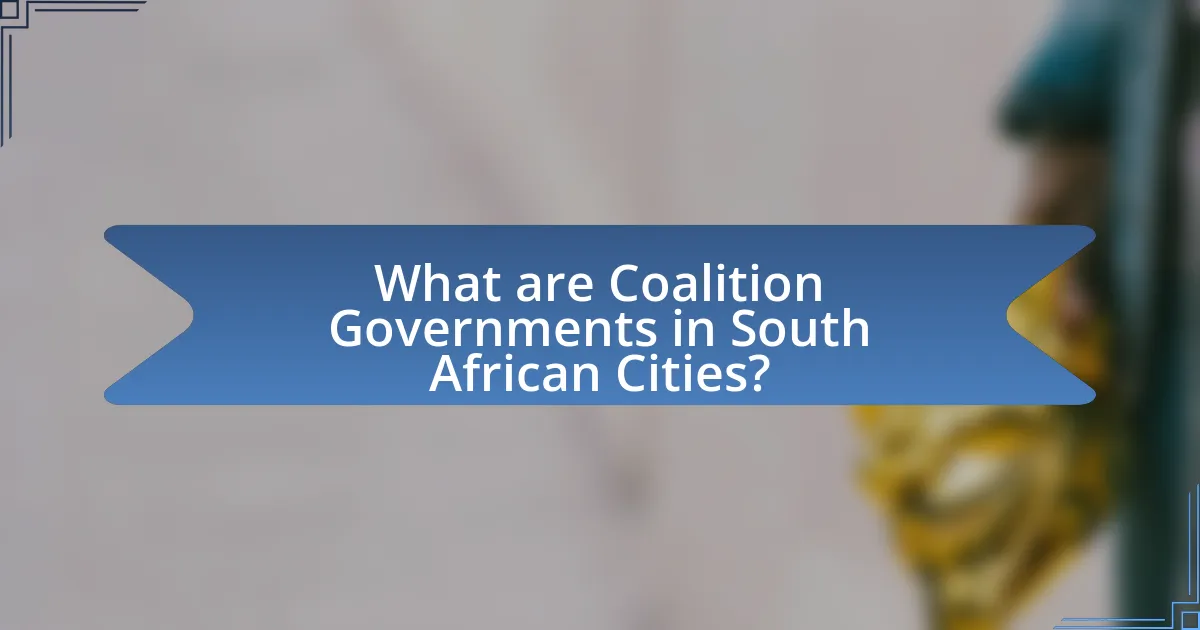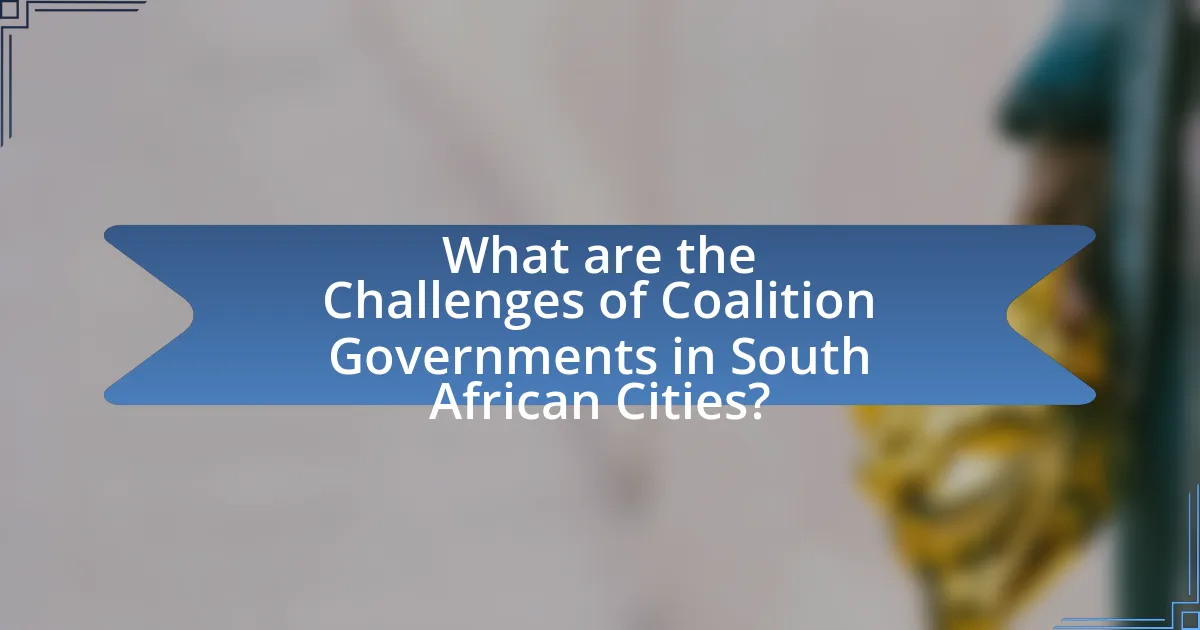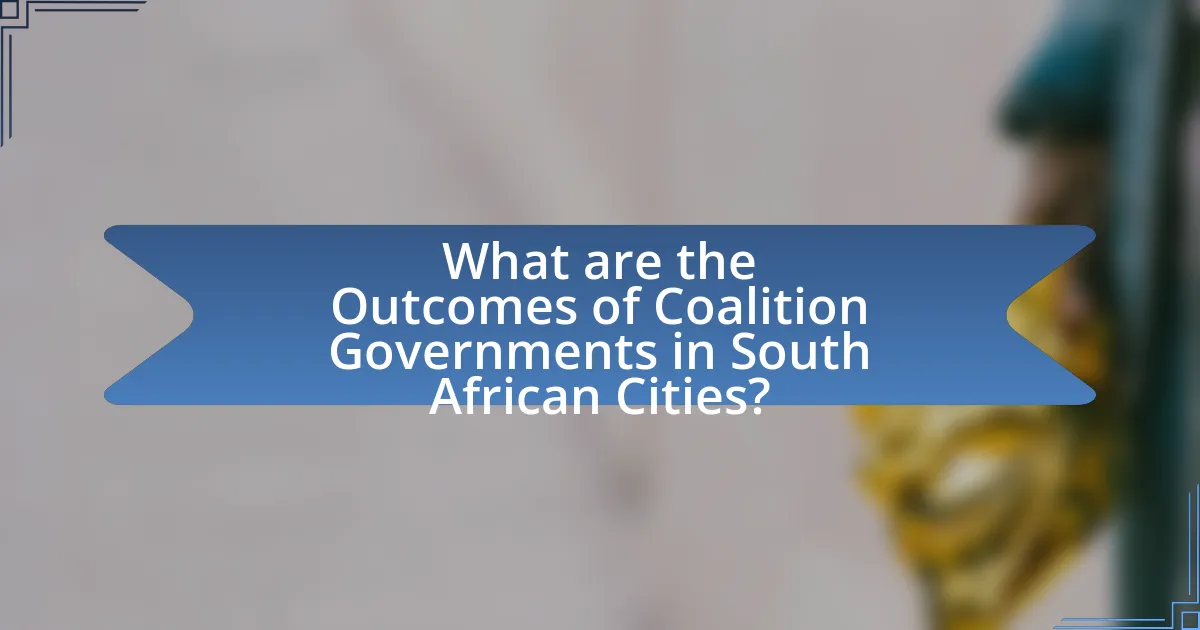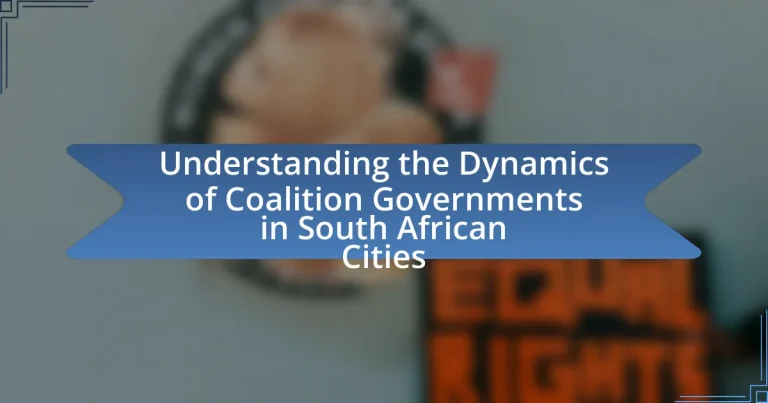Coalition governments in South African cities are political alliances formed when no single party achieves a majority in municipal elections, reflecting the country’s diverse political landscape. This article examines the formation, significance, and challenges of these coalitions, highlighting how electoral systems, party fragmentation, and ideological alignment influence governance. It also explores the impact of coalition dynamics on local service delivery, policy-making, and urban development, while addressing internal conflicts and external factors that affect coalition stability. The discussion includes lessons learned from existing coalitions and best practices for enhancing their effectiveness, emphasizing the importance of citizen engagement in the governance process.

What are Coalition Governments in South African Cities?
Coalition governments in South African cities are political alliances formed between multiple parties to govern, especially when no single party secures an outright majority in municipal elections. These coalitions are often necessary in the context of South Africa’s diverse political landscape, where various parties represent different interests and constituencies. For instance, after the 2016 local elections, several major cities, including Johannesburg and Tshwane, saw the establishment of coalition governments as the African National Congress (ANC) lost its majority, leading to partnerships primarily between the Democratic Alliance (DA), Economic Freedom Fighters (EFF), and other smaller parties. This shift reflects the evolving dynamics of governance in South Africa, where collaboration among parties is essential for effective administration and policy-making in urban areas.
How do Coalition Governments form in South African cities?
Coalition governments in South African cities form through negotiations among political parties following local elections, particularly when no single party secures an outright majority. These negotiations involve discussions on policy agreements, power-sharing arrangements, and the allocation of key positions within the municipal council. For instance, after the 2016 local elections, several cities, including Johannesburg and Tshwane, saw the formation of coalitions as the African National Congress (ANC) lost its majority, leading to partnerships primarily between the Democratic Alliance (DA) and smaller parties like the Economic Freedom Fighters (EFF). This process is often influenced by the need for stability and governance efficiency, as parties seek to combine resources and voter bases to effectively manage city administrations.
What political factors contribute to the formation of coalitions?
Political factors that contribute to the formation of coalitions include electoral systems, party fragmentation, and ideological alignment. Electoral systems, such as proportional representation, often lead to multiple parties gaining seats, necessitating coalitions for governance. In South Africa, the 2019 elections demonstrated this, as no single party secured an outright majority, prompting alliances among parties to form a government. Party fragmentation occurs when numerous parties compete for power, making it difficult for any one party to dominate, which was evident in the diverse political landscape of South African cities. Additionally, ideological alignment among parties can facilitate coalition formation, as parties with similar goals are more likely to collaborate, as seen in various municipal coalitions where parties with shared interests unite to achieve common objectives.
How do electoral systems influence coalition dynamics?
Electoral systems significantly influence coalition dynamics by determining how votes translate into seats, which affects party representation and the likelihood of forming coalitions. For instance, proportional representation systems often lead to multi-party scenarios, necessitating coalitions for governance, as seen in South Africa’s municipal elections where no single party typically secures an outright majority. This system encourages smaller parties to participate, thereby increasing the complexity of coalition negotiations and dynamics. In contrast, majoritarian systems tend to favor larger parties, often resulting in fewer coalitions and more stable governments, as evidenced by the dominance of the African National Congress in many South African municipalities. Thus, the structure of the electoral system directly shapes the political landscape and coalition-building processes.
Why are Coalition Governments significant in South Africa?
Coalition governments are significant in South Africa because they reflect the country’s diverse political landscape and promote inclusivity in governance. Given the multiparty system, coalition governments enable various political parties to collaborate, ensuring that a broader range of voices and interests are represented in decision-making processes. For instance, the 2016 local elections resulted in several municipalities being governed by coalitions, highlighting the shift away from dominant party rule and fostering accountability and responsiveness to local needs. This dynamic is crucial in a nation with a history of deep social and economic divides, as coalitions can facilitate dialogue and compromise among different groups, ultimately contributing to political stability and democratic resilience.
What impact do they have on local governance?
Coalition governments significantly influence local governance by promoting collaborative decision-making and enhancing representation of diverse community interests. In South African cities, these coalitions often bring together multiple political parties, which can lead to more inclusive policies that reflect a broader spectrum of societal needs. For instance, research indicates that coalition governance can improve service delivery and accountability, as seen in cities like Cape Town, where coalition dynamics have led to increased public participation in local governance processes. This collaborative approach can also mitigate the risks of unilateral decision-making, fostering a more democratic environment in local administrations.
How do they affect service delivery in urban areas?
Coalition governments in South African cities significantly affect service delivery by introducing complexities in decision-making and resource allocation. These governments often face challenges in reaching consensus among diverse political parties, which can lead to delays in implementing essential services such as water supply, waste management, and infrastructure development. For instance, a study by the South African Institute of Race Relations highlights that cities governed by coalitions experience slower service delivery timelines compared to those with single-party control, as conflicting priorities among coalition partners can hinder effective governance.

What are the Challenges of Coalition Governments in South African Cities?
The challenges of coalition governments in South African cities include political instability, policy gridlock, and difficulties in resource allocation. Political instability arises from the need for multiple parties to agree on governance, often leading to conflicts and a lack of cohesive direction. Policy gridlock occurs when coalition partners cannot reach consensus on key issues, hindering effective decision-making and implementation of policies. Additionally, resource allocation becomes contentious as different parties prioritize their interests, which can result in unequal distribution of services and funding across communities. These challenges are evident in cities like Johannesburg and Tshwane, where coalition dynamics have led to frequent leadership changes and stalled initiatives.
What internal conflicts arise within coalition governments?
Internal conflicts within coalition governments often arise from ideological differences, power struggles, and conflicting policy priorities among the coalition partners. These conflicts can manifest in disagreements over budget allocations, legislative agendas, and governance strategies, leading to instability and inefficiency in decision-making processes. For instance, in South Africa, coalition governments have experienced tensions when parties prioritize their own agendas over collective goals, resulting in public disputes and a lack of cohesive governance. Such internal strife can hinder the coalition’s ability to effectively address pressing issues, ultimately affecting public trust and the overall functionality of the government.
How do differing party ideologies create challenges?
Differing party ideologies create challenges in coalition governments by leading to conflicts over policy priorities and governance strategies. For instance, when parties with contrasting views on economic management, social issues, or governance approaches come together, they often struggle to find common ground, resulting in gridlock or ineffective decision-making. A specific example can be seen in South Africa, where coalitions formed between parties with divergent ideologies have faced difficulties in implementing cohesive policies, as evidenced by the challenges in the City of Johannesburg, where ideological divides have hindered service delivery and urban development initiatives.
What role does leadership play in managing conflicts?
Leadership plays a crucial role in managing conflicts by providing direction, facilitating communication, and fostering collaboration among conflicting parties. Effective leaders assess the underlying issues causing the conflict, mediate discussions, and promote a culture of understanding and respect. For instance, in coalition governments, leaders must navigate diverse interests and perspectives, often employing negotiation strategies to reach consensus. Research indicates that strong leadership can reduce conflict escalation and enhance problem-solving capabilities, as seen in various case studies of successful coalition management in South African cities, where leaders effectively balanced competing demands to maintain stability and governance.
How do external factors influence coalition stability?
External factors significantly influence coalition stability by affecting the political environment and the relationships among coalition partners. For instance, economic conditions, public opinion, and external political pressures can create challenges or opportunities for coalitions. A study by the Institute for Security Studies highlights that economic downturns often lead to increased public dissatisfaction, which can destabilize coalitions as parties may seek to distance themselves from unpopular decisions. Additionally, external political events, such as elections or shifts in international relations, can alter the dynamics within coalitions, prompting parties to reassess their alliances and strategies.
What impact do public opinion and media have on coalitions?
Public opinion and media significantly influence coalitions by shaping public perceptions and political narratives. When public opinion is favorable towards certain coalition partners or policies, it can strengthen the coalition’s stability and effectiveness, as seen in South Africa’s coalition governments where voter sentiment often dictates party alliances. Conversely, negative media coverage can undermine coalition unity by highlighting conflicts or failures, leading to public discontent and potential fragmentation. For instance, during the 2016 local elections in South Africa, media portrayal of coalition dynamics affected voter trust and party strategies, illustrating the media’s role in either bolstering or destabilizing coalitions.
How do economic conditions affect coalition performance?
Economic conditions significantly influence coalition performance by impacting resource allocation, public support, and policy effectiveness. When economic conditions are favorable, coalitions can implement policies that enhance public welfare, leading to increased approval ratings and stability. Conversely, during economic downturns, coalitions may struggle to deliver on promises, resulting in public dissatisfaction and potential fragmentation. For instance, the 2008 global financial crisis led to weakened coalition governments in various countries, as economic challenges undermined their ability to govern effectively and maintain unity. This demonstrates that economic stability is crucial for coalition success, as it directly affects their operational capacity and public perception.

What are the Outcomes of Coalition Governments in South African Cities?
Coalition governments in South African cities have led to both increased political diversity and challenges in governance. The presence of multiple parties in coalition often results in a broader representation of interests, allowing for more inclusive decision-making processes. However, this diversity can also lead to instability and conflicts among coalition partners, which may hinder effective governance and policy implementation. For instance, the coalition in Johannesburg faced difficulties in passing budgets due to disagreements among parties, illustrating the potential for gridlock. Additionally, research by the Institute for Security Studies indicates that while coalitions can enhance accountability, they may also complicate service delivery due to competing priorities among coalition members.
How do coalition governments affect policy-making?
Coalition governments affect policy-making by necessitating compromise among diverse political parties, which can lead to more inclusive and representative policies. In South Africa, coalition dynamics often require parties to negotiate and collaborate, resulting in policies that reflect a broader spectrum of interests. For instance, the 2021 local elections in South Africa saw several municipalities governed by coalitions, where parties had to align their agendas to form stable governments, thereby influencing policy outcomes to accommodate various stakeholders. This collaborative approach can enhance democratic legitimacy but may also slow down decision-making processes due to the need for consensus.
What are the implications for urban development policies?
The implications for urban development policies in the context of coalition governments in South African cities include the necessity for collaborative decision-making and the integration of diverse stakeholder interests. Coalition governments often lead to a more complex policy-making environment, requiring urban development policies to be adaptable and inclusive to accommodate varying political agendas and community needs. For instance, the 2016 local elections in South Africa resulted in numerous coalition governments, which highlighted the importance of consensus-building in urban planning initiatives. This shift necessitates policies that prioritize transparency, public participation, and equitable resource distribution to effectively address urban challenges such as housing, infrastructure, and service delivery.
How do coalitions influence social policies in cities?
Coalitions influence social policies in cities by uniting diverse political groups to create comprehensive policy agendas that reflect a broader range of community interests. This collaborative approach allows for the pooling of resources, expertise, and public support, which can lead to more effective implementation of social policies. For example, in South African cities, coalitions have been shown to address issues such as housing, education, and healthcare more effectively by integrating various stakeholder perspectives, thus enhancing policy responsiveness and accountability. Research indicates that coalition governments can lead to innovative solutions that single-party administrations may overlook, as they are compelled to negotiate and compromise, ultimately resulting in policies that better serve the needs of the urban population.
What lessons can be learned from existing coalition governments?
Existing coalition governments demonstrate the importance of compromise and negotiation in achieving stable governance. For instance, the coalition government in Germany has shown that diverse political parties can work together to create effective policies, as evidenced by their collaborative approach to climate change and economic recovery. Additionally, coalition governments often highlight the necessity of clear communication and shared goals among partners to prevent conflicts and ensure cohesive decision-making, as seen in the Netherlands, where coalition agreements outline specific policy priorities. These examples illustrate that successful coalitions require mutual respect, transparency, and a commitment to collective objectives to navigate the complexities of governance effectively.
What best practices can enhance coalition effectiveness?
Best practices that can enhance coalition effectiveness include establishing clear communication channels, defining shared goals, and fostering mutual respect among coalition members. Clear communication ensures that all parties are informed and aligned, which is crucial for decision-making and conflict resolution. Defining shared goals helps to unify the coalition’s efforts and provides a common purpose, which can increase motivation and collaboration. Fostering mutual respect among coalition members encourages a positive working environment, which is essential for maintaining long-term partnerships. Research indicates that coalitions with strong communication and shared objectives are more likely to achieve their intended outcomes, as evidenced by successful case studies in various governance contexts.
How can future coalitions be structured for success?
Future coalitions can be structured for success by establishing clear communication channels, defining shared goals, and ensuring equitable power distribution among coalition members. Effective communication fosters transparency and trust, which are essential for collaboration. Defining shared goals aligns the coalition’s efforts and provides a common purpose, while equitable power distribution prevents dominance by any single party, promoting stability and cooperation. Historical examples, such as the coalition government in Cape Town, demonstrate that these elements contribute to effective governance and sustained partnerships.
What strategies can citizens employ to engage with coalition governments?
Citizens can engage with coalition governments by actively participating in local governance processes, such as attending public meetings and forums. This involvement allows citizens to voice their concerns and influence decision-making. Additionally, citizens can form or join advocacy groups that focus on specific issues, thereby amplifying their collective voice and increasing pressure on coalition leaders to address community needs. Research indicates that active civic engagement leads to more responsive governance, as seen in various South African municipalities where citizen participation has resulted in improved service delivery and accountability.


